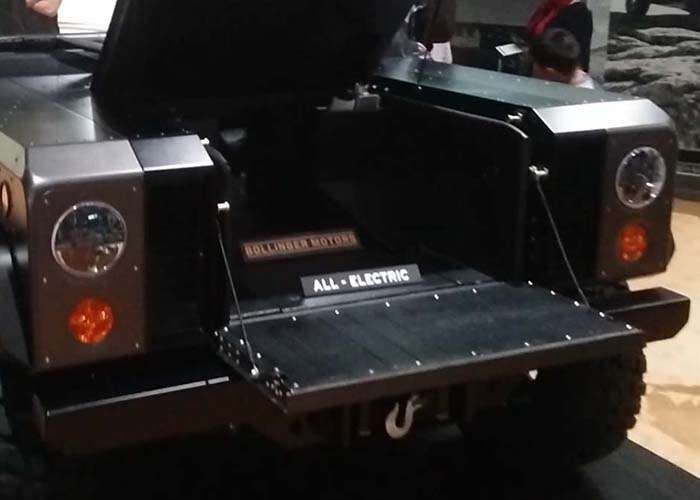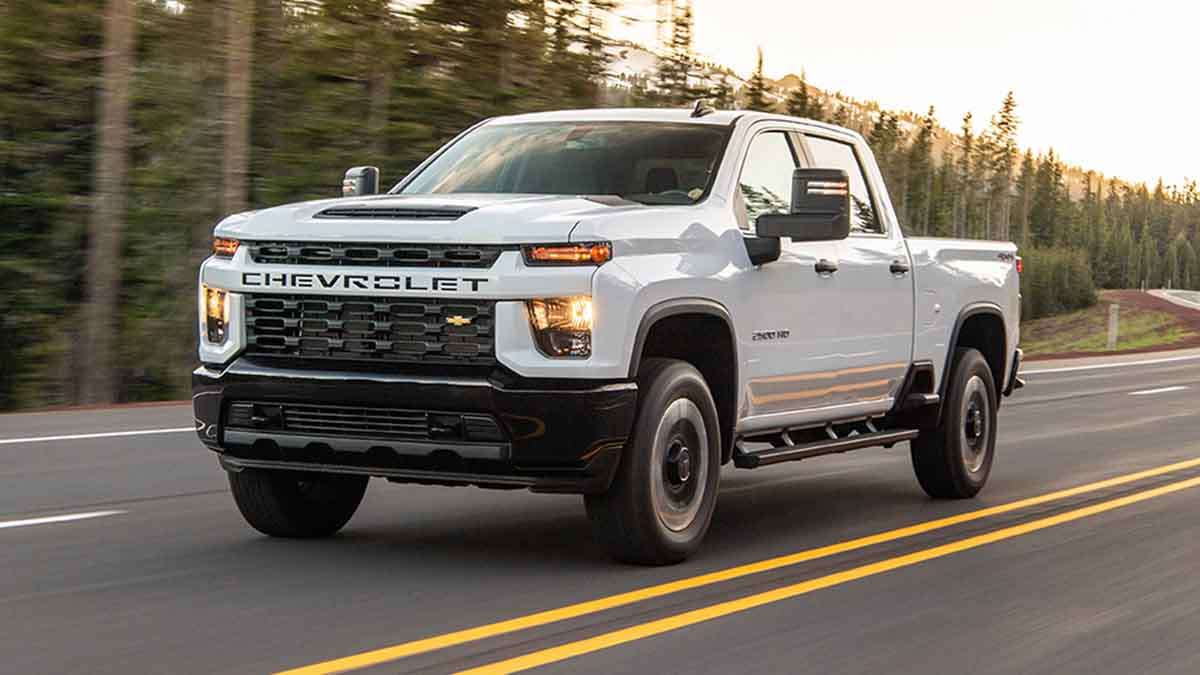GM is currently in negotiations with the UAW after a worker strike, and some in the EV world were surprised to see GM offer manufacturing of an electric truck at the now unallocated Detroit-Hamtramck facility as a bargaining chip. This, however, shouldn’t be a surprise. Josh Tavel, GM's lead engineer for electric vehicles such as the Bolt EV and Spark EV, is rumored to be leading the development of a full-size electric truck. The source, according to a recent Reuter’s article, claims that this truck will be ready to unveil by 2021. GM has not officially confirmed this story, but it aligns with a number of recent developments.
Electric Cadillac Escalade Could Share Chassis
Earlier this year, a story broke that GM was working on a future Cadillac Escalade EV, which they hoped would achieve 400 miles of driving range on a charge, and the connection between an Escalade EV and a full-size EV truck is more direct than it might appear.
GM has been forthcoming with their dedicated electric vehicle chassis, such as the BEV2 platform (currently used in the Bolt EV and expected to be the basis for GM's two upcoming electric SUVs expected by 2020) and the BEV3 platform (planned for use in GM's upcoming lineup of Cadillac EVs). It is unlikely, though, that either of those platforms would support GM's larger SUVs and trucks.
However, it appears that the 2021 Cadillac Escalade will be using GM's GMT T1XX chassis (the T1XX chassis replaces the K2XX chassis and will be used across GM's lineup of trucks and body-on-frame SUVs). Given GM's recent efforts in streamlining and developing multi-use chassis compatible with a number of different power trains, it's unlikely that the upcoming Escalade EV will use anything other than the T1XX chassis.
And if the T1XX chassis is compatible with electric power trains, it's a direct connection to an all-electric, full-size truck. So if all of this is true, what, exactly, is Josh Tavel up to? And what could we expect from GM's first all-electric truck since the S-10 EV? I’m just going to call it the Silverado EV. Here are some of my predictions:
Silverado EV Expected Range
It's nice to dream of 400-mile ranges in electric trucks, but frankly, I don't think that's a realistic expectation without making serious functional concessions or increasing the price beyond what the average truck buyer can afford. Trucks are inherently inefficient, even when compared to their SUVs cousins based on similar chassis.
If 400 miles of range is GM's goal with the Escalade EV, that can likely be achieved with a 150 kWh to 180 kWh battery pack (roughly two and a half to three times the size of the current Bolt EV pack). Those same battery pack sizes in a full-size truck might be able to support 300 to 350 miles of driving range in a truck, though as recent TFL videos have demonstrated, those who need to tow even average trailer loads should expect to double or even triple their energy consumption.
GM Battery Technology
GM's recent 2020 Bolt EV press release indicates that they now have access to new batteries. These could be the same batteries Mary Barra referred to in her 2017 Barclays presentation, or they could be an interim solution. In either case, GM appears to have increased the energy density at a pack level to roughly 153 Wh/kg, and if they also achieved a cost of $100/kWh, we can start modelling what these new truck batteries might look like.
For this estimate, let's assume that GM is targeting a 150 kWh pack size using the battery cells from the upcoming 2020 Bolt EV. On the most basic level, a 150 kWh battery with153 Wh/kg energy density would weigh about 980 kg or 2,156 lbs; however, the battery casing and non-cell material weight isn't likely to scale at a 1-to-1 ratio. In fact, the weight of the casing relative to the weight of the battery cells should decrease as pack sizes increase.
Using the original Bolt EV's battery, we might be able to determine a more accurate battery pack weight. According to an Insideevs breakdown, the outgoing Bolt EV battery had a cell energy density of 237 Wh/kg. At a pack level, it had an energy density of 138 Wh/kg. If the 202 Bolt EV's ~10% energy increase applies at a battery cell level, we can expect these new GM cells to have an energy density of about 260 Wh/kg.
At 260 Wh/kg, a 150 kWh battery's cells alone would weigh 577 kg or 1,269 lbs. The case, wiring, and coolant systems would most definitely weigh more on a 150 kW battery than they would in the Bolt EV's 60 kWh battery; however, it's not likely to comprise 40% of the total pack weight. I expect a 150 kWh pack would top out at no more than 2,000 lbs. That's still a significant amount of weight, but it might not be that outrageous on a vehicle with a GVWR that ranges from 6,800 lbs in the Silverado 1500 to 11,500 lbs in the Silverado 3500HD, especially when considering weight savings from common internal combustion components.
Silverado EV Power Train
Up to this point, GM has not made a four-wheel drive or all-wheel drive electric vehicle, but that might need to change for an EV truck. Also, in recent years, GM has favored permanent magnet AC (PMAC) motors over induction motors, and that also might need to change. Neither motor type is strictly better than the other, but they have complementary strengths. PMAC motors are more efficient over a broader range of speeds, but induction motors are easier to configure for towing and to "put to sleep" for efficient highway cruising.
Given those considerations, it seems that the obvious choice is for GM to design this truck with both an induction motor and a PMAC motor. It would be natively AWD, be able to leverage the strengths of both motors, and be significantly cheaper to produce than electric trucks with four motors – one for each wheel as other automakers such as Rivian are using.
Standard Chevy Truck Design
The design is where it gets tricky. GM is simultaneously capable of being extremely innovative and extremely conservative. Styling is one of the areas where they tend to be conservative, which is unfortunate, because many of the most beneficial features for efficiency also result in radical redesigns.
If GM maintains the styling from the rest of their truck lineup, the front of the truck will have significant space available the engine and related components are removed. Most other EV truck makers are attempting to leverage that space as additional or pass-through storage space. The Bollinger B1, for example, provides a front loading gate. If GM does choose to reallocate that space, I would prefer to see them use it as storage for a full spare tire, jack, and toolbox. To me, Rivian committed a cardinal work-truck sin by storing the R1T's spare tire in the bed of the truck.

Regardless of what happens with the front end cargo, can we all agree to not call it a "frunk." If a load gate is involved, the next thing you know, we'll be calling it a "frailgate" or even worse, a "failgate." Though, to be fair, Ford might already have that last one covered. ;-) Hey, as a longtime Ford truck owner, I get to say that.
Silverado EV MSRP
Price will be the biggest problem for an even moderately capable electric truck. A Chevy Silverado 1500 can be had for under $30,000. If the $100/kWh and 150 kWh battery are correct, we're looking at half the total MSRP of the internal combustion Silverado 1500 in battery cost alone. Even if the rest of the EV components are similar in price to the internal combustion components that they replace, we're still looking at a minimum price of $45,000, and that's only if GM passes the direct cost of the battery onto customers.
One unique cost advantage that GM does enjoy over rival electric truck makers like Rivian and Tesla is that GM already has an electric-truck chassis (T1XX) and can share production costs with far higher volume internal combustion trucks. And if GM can replicate their success with the Bolt EV by sharing assembly lines with other internal combustion models, they could see an even greater cost advantage.

One significant hurdle GM faces in terms of cost competitiveness is that, by the time this EV truck is released, GM vehicles will no longer eligible for the $7,500 Federal Tax Credit, which could provide their competitors such as Ford and Rivian with a price advantage. Tesla, however, is in the same boat as GM; they have also exhausted their Federal Tax Credit eligibility.
I think that the most likely scenario is we see a base price of $50,000 to $55,000 for a basic version of GM's EV pickup, which would make it considerably cheaper than the $69,000 starting price of the Rivian R1T but similarly priced to Tesla's claimed $50,000 starting price for their upcoming EV truck.
Silverado EV Will Be Capable
So far, GM has not seen the need to join in the charge cord measuring contest of whose EV is fastest. Even in the realm of gas pickups, GM didn't really play along with Ford's Raptor. That's not to say that GM's offerings under perform. In fact, quite the opposite is true. While none of GM's modern EVs have ventured into the realm of ludicrousness, they all fare well in terms of acceleration and spirited driving. If GM maintains that standard with their electric truck, we are likely to see 0-60 mph acceleration times in the 7-second range, which is more than acceptable.
In terms of capabilities that actually matter, I think that this EV truck will, unfortunately, have ratings that are hobbled compared to its internal combustion counterparts. I don't think it's reasonable to expect a payload capacity of more than 1,500 lbs. Also, a towing capacity of more than 5,000 lbs is hard to imagine. If GM exceeds either of those capacities in a base, full size electric truck for around $50,000, it is a cause for celebration.
GM President Mark Reuss has been open about the fact that GM has no immediate plans for heavy duty EV trucks, which is why I don't expect GM to even try to match their HD truck lineup's capabilities with their upcoming electric truck.
Silverado EV Charging Speeds
This, too, I think is too early to tell. Even using the 2020 Bolt EV's new battery cells as a basis, we don't know what to expect in terms of charging rates. The most conservative estimates would be the same 1 C charging rate we see in the outgoing Bolt EV, or a 150 kW charging rate in the case of a 150 kWh battery pack. In terms of charging speeds, 150 kW might seem fast when it's applied to small, efficient electric cars, such as the Bolt EV; however, when that charging rate is applied to less efficient SUV or truck, it is much less impressive.
A one-hour charge session to recoup 80% of your range while towing (possibly 150 to 175 miles) just isn't defensible. Working backward, an acceptable charging rate would need to bring the battery to 80% in no more than 30 to 40 minutes, so GM would really needs to target an average charging rate to 80% of no less than 180 kW to 240 kW.
Conclusion
Based on the information we currently have, it does appear that GM will be ready to unveil a full-size electric truck by 2021. That timeline might put GM behind Rivian, which claims its truck will already be in production by that point, and Tesla, which should be unveiling their electric truck in November. However, this could play out in a similar way to the Chevy Bolt EV and Tesla Model 3 where – on the surface – these electric trucks might be released at a similar time and appear to be competing with each other. In actuality, though, they will likely appeal to very different audiences.
See you next time when I will be discussing the things you should consider when buying a new electric car.
See you in my next story where I am providing a buying guide for the Chevy Bolt EV. Also, check Torque News reporter Al Castro's latest story discussing the "truth behind a Cadillac engine that doesn’t fit in Any other Cadillac car."
Eric Way focuses on reporting expert opinion on GM brand electric vehicles at Torque News. Eric is also an instructional designer and technical writer with more than 15 years of writing experience. He also hosts the News Coulomb video blog, which focuses on electric vehicles, charging infrastructure, and renewable energy. Eric is an active member of the EV Advocates of Ventura County, a volunteer organization focused on increasing the widespread adoption of electric vehicles. You can follow Eric on News Coulomb Youtube, on Facebook at @NewsCoulomb as well as on Twitter at @eway1978.






Comments
This would be fantastic if
Permalink
This would be fantastic if true and having Josh Tavel involved is the right move. Now, where's the electric Blazer or Equinox? Or whatever else they're supposed to be putting on the Bolt platform?
That would be great. Having
Permalink
That would be great. Having met Josh before, he’s a pretty awesome guy. He also engineered the driving dynamics behind the Spark EV and Bolt.
It would be smart to make the
Permalink
It would be smart to make the first one a light half-ton, like a Ranger or Sedona. There is nothing in the market at that size right now.
Come to think of it, GM
Permalink
Come to think of it, GM better be developing an electric truck. And an Express van. Amazon just ordered 100k of the Rivian vans for commercial delivery. Who would have thought Rivian had planned for commercial trucks too?
Eric does a good job of
Permalink
Eric does a good job of mentioning "fast" charge of a 150kwh battery in a full size vehicle. I am curious how consumers will deal with home charging of such a large battery. To keep charge times under 12 hours, If GM marries two 7.2kwh chargers to each full-size truck as I suspect they will, I have to wonder what electrical conversations will take place when folks have to buy a 60-70 amp EVs and install 80amp service. While you can get away with a volt or bolt at lower amp home charging on a home with 100 amp service, I think even 200 amp service might be a strain to add 60 continuous amps for 8-10 hours a night.
A GM employee here on one of
Permalink
A GM employee here on one of the forums said gm is working on batteries able to take 400 kw.
Nice article Eric. You
Permalink
Nice article Eric. You covered all the bases. I am troubled by the deafening silence from GM regarding an EV pickup. They said that Cadillac was going to be the "Vanguard" for EVs in GM, so until they formally announce a production Caddillac BEV I don't see an EV Silverado being released. Plus with the huge profit currently with the Escalade, it would be a strong candidate to lead the EV push. Still, Tesla and Rivian are definitely not slowing down to let Ford and GM catch up, seeing that they have millions of loyal fans who could make the transition to EV if the price is right and nothing is lost in translation from their conventional trucks. I do not see charging as much of an issue. Most people who own EVs just charge their vehicles for the electricity used, which can easily get accomplished overnight. Specialty uses like distance hauling, towing, or commercial use could be handled by a larger battery option and a faster home/work charger. My neighbor have to be granted special permission when he asked for a 70 amp home service for his Tesla Model S, but he never really needed it. The average price of a new pickup in the U.S. is $48K, and GM is making close to that price in profit on each Escalade, so even though gas/diesel vehicle will offer more profit and the EV pickup wouldn't be as cheap as their base model gas trucks, potentially they could still make them profitability in the U.S. if they worked efficiently and shared the cost across multiple platforms as you mentioned.